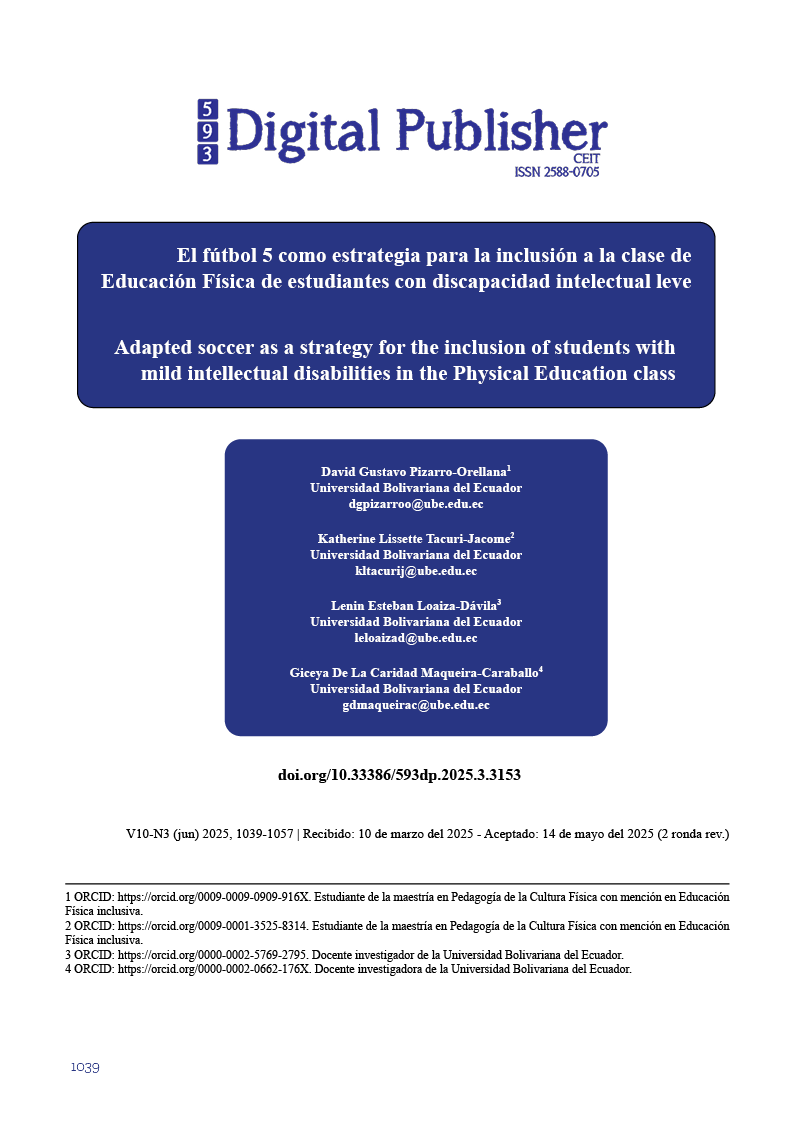El fútbol 5 como estrategia para la inclusión a la clase de Educación Física de estudiantes con discapacidad intelectual leve
Contenido principal del artículo
Resumen
La inclusión en la Educación Física es un reto crucial para garantizar la equidad en el aprendizaje de todos los estudiantes. Este estudio tuvo como objetivo evaluar la efectividad del fútbol 5 como estrategia inclusiva para mejorar la participación y el desarrollo social de estudiantes con discapacidad intelectual (DI) leve en las clases de Educación Física. Se utilizó un enfoque de investigación mixto con un diseño no experimental, de alcance descriptivo y transversal en su fase cuantitativa, complementado con un análisis fenomenológico en su fase cualitativa. La muestra incluyó 24 estudiantes, de los cuales el 25% presentaban un diagnóstico de DI leve. Se aplicaron como instrumentos la observación estructurada y entrevistas semiestructuradas a estudiantes y docentes para evaluar los parámetros de inclusión, respeto, participación y percepción de logro.
Los resultados indicaron que la implementación del fútbol 5 favoreció significativamente la interacción social y el respeto mutuo entre los estudiantes, promoviendo un ambiente inclusivo. Sin embargo, los estudiantes con DI leve percibieron menor efectividad en las adaptaciones implementadas y mostraron una percepción de logro inferior a la de sus compañeros sin discapacidad. Esto sugiere la necesidad de ajustar continuamente las estrategias inclusivas para garantizar una participación equitativa. Se concluye que el fútbol 5 es una herramienta efectiva para la inclusión en la Educación Física, pero su impacto puede optimizarse con metodologías adaptadas y un refuerzo positivo constante que motive la percepción de logro en los estudiantes con DI leve.
Descargas
Detalles del artículo

Esta obra está bajo una licencia internacional Creative Commons Atribución-NoComercial-CompartirIgual 4.0.
1. Derechos de autor
Las obras que se publican en 593 Digital Publisher CEIT están sujetas a los siguientes términos:
1.1. 593 Digital Publisher CEIT, conserva los derechos patrimoniales (copyright) de las obras publicadas, favorece y permite la reutilización de las mismas bajo la licencia Licencia Creative Commons 4.0 de Reconocimiento-NoComercial-CompartirIgual 4.0, por lo cual se pueden copiar, usar, difundir, transmitir y exponer públicamente, siempre que:
1.1.a. Se cite la autoría y fuente original de su publicación (revista, editorial, URL).
1.1.b. No se usen para fines comerciales u onerosos.
1.1.c. Se mencione la existencia y especificaciones de esta licencia de uso.
Citas
Acosta Echavarría, Álvaro A., Montoya Arenas , D. A., Landinez , D., González Uribe , A. M., & Gómez Tabares, A. S. (2024). Effect of an executive function cognitive training program on the planning component in adults with mild intellectual disability. Pensamiento Americano, 17(34), e-617. https://doi.org/10.21803/penamer.17.34.617
Angulo, J., Assar, E., Álvarez-Bustos, A., & Rodríguez-Mañas, L. (2020). Physical activity and exercise: Strategies to manage frailty. Redox Biology, 35. https://doi.org/10.1016/j.redox.2020.101513
Bartlo, P., & Klein, P. (2011). Physical activity benefits and needs in adults with intellectual disabilities: systematic review of the literature. American journal on intellectual and developmental disabilities, 116 3, 220-32. https://doi.org/10.1352/1944-7558-116.3.220
Cañola Campos, E. I., Contreras Jauregui, F. A., & Maqueira Caraballo, G. de la C. (2025). Estrategia Metodológica para la Inclusión en el Futbol Adaptado Para Inclusión de Estudiante con Discapacidad Intelectual. Dominio De Las Ciencias, 11(1), 1448–1466. https://doi.org/10.23857/dc.v11i1.4249Carbone, P., Smith, P., Lewis, C., & Leblanc, C. (2021). Promoting the Participation of Children and Adolescents With Disabilities in Sports, Recreation, and Physical Activity. Pediatrics, 148 6. https://doi.org/10.1542/peds.2021-054664
Chasciar, V. (2024). Improving social competences through sport: an exploration of the educational role of physical activity in adolescent development. Journal Plus Education. 35(1), 130-136. https://doi.org/10.24250/jpe/1/2024/vc/
Farias, C., Hastie, P. A., & Mesquita, I. (2015). Towards a more equitable and inclusive learning environment in Sport Education: results of an action research-based intervention. Sport, Education and Society, 22(4), 460–476. https://doi.org/10.1080/13573322.2015.1040752
Fave, D., Bassi, M., Boccaletti, E., Roncaglione, C., Bernardelli, G., & Mari, D. (2018). Promoting Well-Being in Old Age: The Psychological Benefits of Two Training Programs of Adapted Physical Activity. Frontiers in Psychology, 9. https://doi.org/10.3389/fpsyg.2018.00828
Furrer, V., Valkanover, S., Eckhart, M., & Nagel, S. (2020). The Role of Teaching Strategies in Social Acceptance and Interactions; Considering Students With Intellectual Disabilities in Inclusive Physical Education., 5. https://doi.org/10.3389/feduc.2020.586960
Graça, A., Estriga, L., & Batista, P. (2024). The Problem of Nurturing Sustainable Inclusion within Team Sports in Physical Education. Sustainability, 16(15), 6379. https://doi.org/10.3390/su16156379
Gray, S., McKay, H., Hoy, C., Lau, E., Ahn, R., Lusina-Furst, S., & Sims-Gould, J. (2020). Getting Ready for Scale-Up of an Effective Older Adult Physical Activity Program: Characterizing the Adaptation Process. Prevention Science, 21, 355-365. https://doi.org/10.1007/s11121-019-01085-3
Hornby, G., & Kauffman, J. M. (2024). Inclusive Education, Intellectual Disabilities and the Demise of Full Inclusion. Journal of Intelligence, 12(2), 20. https://doi.org/10.3390/jintelligence12020020
Horváth, E., & Szekeres, Ágota. (2023). Changes in the Social Characteristics of General Classroom Communities Including Children with Mild Intellectual Disability in Three Years. International Journal of Special Education, 38(2), 176–187. https://doi.org/10.52291/ijse.2023.38.32
Kashi, A., Dawes, H.., Mansoubi, M., & Sarlak, Z. (2023). The Effect of an Exercise Package for Students with Intellectual Disability on Motor and Social Development: Exercise package for students with Intellectual disability. Iranian Journal of Child Neurology, 17(2), 93–110. https://doi.org/10.22037/ijcn.v17i1.36644
Kavanagh, H., Manninen, M., & Issartel, J. (2023). Comparing the fundamental movement skill proficiency of children with intellectual disabilities and typically developing children: a systematic review and meta-analysis. Journal of intellectual disability research : JIDR. 67(12), 1336-1353. https://doi.org/10.1111/jir.13012
Klefbeck, K. (2020). Lesson study for students with intellectual disability. International Journal for Lesson & Learning Studies. 9(3), 245-259. https://doi.org/10.1108/ijlls-12-2019-0082
Longpoe, P. K., & Adebisi, R. O. (2023). Cognitive skill instruction on enhancing retention in pupils with mild intellectual disability. Journal of Social, Humanity, and Education, 3(4), 297–306. https://doi.org/10.35912/jshe.v3i4.1490
Lopez-Diaz, J. M., Felgueras Custodio, N., & Garrote Camarena, I. (2021). Football as an Alternative to Work on the Development of Social Skills in Children with Autism Spectrum Disorder with Level 1. Behavioral Sciences, 11(11), 159. https://doi.org/10.3390/bs11110159
López Díaz, J. M., Moreno Rodríguez, R., & López Bastías, J. L. (2021). Fútbol como programa deportivo para menores con TEA en educación primaria. Cuadernos de Investigación Educativa, 12(1), 22-33. https://doi.org/10.18861/cied.2021.12.1.3065
Mendoza Sanchez, W. F. (2024). Curricular Adaptations for the learning of mathematical concepts in students with intellectual educational needs. Minerva, 5(13), 117-126. https://doi.org/10.47460/minerva.v5i13.158
Mezo, A. M., Almajan-Guță, B., & Petracovschi, S. (2022). The social matter of including pupils with special educational needs in physical education classes. Studia Universitatis Babeș-Bolyai Educatio Artis Gymnasticae, 67(2), 97–116. https://doi.org/10.24193/subbeag.67(2).16
Muñoz Jiménez, J., Rodríguez Jiménez, P., Collado Mateo, D., & León Guzmán, K. F. (2015). Deporte de orientación para personas con discapacidad intelectual. E-balonmano.com: Revista de Ciencias del Deporte, 11(3), 219-227.
Niure, D. P., & Shrestha, M. K. (2023). Strategies for Including the Excluded in Education: A Case of Children with Intellectual Disabilities. Education Quarterly, 4(1), 17–30. https://doi.org/10.3126/jeqtu.v4i1.57243
Ogarrio, C., Bautista, A., Nidia Carolina Barahona, N., María Elena Chávez, M. E., & Hoyos, G. (2021). Efecto de un programa de Educación Física con actividades motrices para desarrollar el área motora en niños con discapacidad intelectual. Revista Ciencias de la Actividad Física UCM, 22(2), 1-12. http://doi.org/10.29035/rcaf.22.2.3
Park, G., Collins, B., & Lo, Y. (2020). Teaching a Physical Activity to Students with Mild to Moderate Intellectual Disability Using a Peer-Delivered Simultaneous Prompting Procedure: A Single-Case Experimental Design Study. Journal of Behavioral Education. 30, 378–396. https://doi.org/10.1007/s10864-020-09373-7
Patel, D., Cabral, M., Ho, A., & Merrick, J. (2020). A clinical primer on intellectual disability. Translational Pediatrics, 9, S23 - S35. https://doi.org/10.21037/tp.2020.02.02
Regaieg, G., Sahli, S., & Kermarrec, G. (2021). Hybrid Program Based on Virtual and Real Games Increases Fundamental Movement Skills in Children With Intellectual Disability: A Quasi-Experimental Study. Adapted physical activity quarterly: APAQ, 1-17. https://doi.org/10.1123/apaq.2020-0180
Sajewicz-Radtke, U., Jurek, P., Olech, M., Łada-Maśko, A. B., Jankowska, A. M., & Radtke, B. M. (2022). Heterogeneity of Cognitive Profiles in Children and Adolescents with Mild Intellectual Disability (MID). International Journal of Environmental Research and Public Health, 19(12), 7230. https://doi.org/10.3390/ijerph19127230
Schnepel, S., & Aunio, P. (2021). A systematic review of mathematics interventions for primary school students with intellectual disabilities. European Journal of Special Needs Education, 37(4), 663–678. https://doi.org/10.1080/08856257.2021.1943268
Sinigovets, V., Sinigovets, L., Pylypenko, M., & Lobas, V. (2022). Dynamics of the development of movement skills of 11-15-year-old students in the process of studying the variable module «Football». Scientific Journal of National Pedagogical Dragomanov University. Series 15. Scientific and pedagogical problems of physical culture (physical culture and sports). https://doi.org/10.31392/npu-nc.series15.2022.12(158).30
Ștefănică, V., Mercea, I., Ursu, V., Gorban, C., Gheorghe, C., Mihaiu, C., & Groza, G. (2024). Enhancing inclusivity: A holistic approach to psychomotor development and adapted football programs for children with intellectual disabilities. Timisoara Physical Education and Rehabilitation Journal. 17(32), 1-10. https://doi.org/10.2478/tperj-2024-0002
Tounsi, O., Masmoudi, L., Trabelsi, K., Koubaa, A., Clark, C., Anouda, C., & Bahloul, M. (2021). Effects of Class-Wide Choice Making on the Behaviour of Students with Mild Intellectual Disability. International Journal of Disability, Development and Education, 69(1), 33–46. https://doi.org/10.1080/1034912X.2021.1998889
Tremblay, J., Douard, E., & Lanovaz, M. (2024). The Family Game to support parents with intellectual disability in managing challenging behaviours: A replication. Journal of applied research in intellectual disabilities: JARID, 37 2, e13207. https://doi.org/10.1111/jar.13207
Yılmaz, A., & Soyer, F. (2018). Effect of Physical Education and Play Applications on School Social Behaviors of Mild-Level Intellectually Disabled Children. Education Sciences, 8(2), 89. https://doi.org/10.3390/educsci8020089





